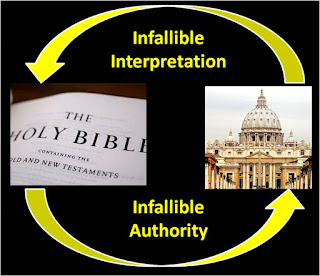Ten points:
1. Protestant confessions go beyond the gospel of
the Substitutionary Atonement, the essential doctrine all Protestants agree upon.
2. A confession that goes beyond the teaching of the gospel
can recognize, as the Westminster standards do, that not all doctrines are equally
plain. (WCF 1.7) In fact, Peter called some of Paul’s writings difficult to
understand. (2 Peter 3:16) So, it’s not surprising that there are differences
among believers. In fact, Scripture teaches that doctrinal differences are
necessary in order to show who has God’s approval. (1 Cor. 11:19) It's no wonder that Paul didn't just point to the papacy instead of Scripture, or that the papacy wasn't invoked in Acts 15. 3. It is fallacious to conclude that disagreement implies non-clarity. Otherwise we’d have to conclude that God’s existence is not clear because professing atheists disagree with theists on God’s existence. (Romans 1:18ff)
4. If we lump Rome in
with all the rest of Trinitarian Christianity (and apply the fallacy of
“disagreement implies lack of perspicuity”) then the disagreements among the
set of all Trinitarians, including Roman Catholics, would imply that all
doctrine held by Trinitarians is dubious, even Rome’s
5. How is it that Scripture is clearer to the Roman
magisterium than to the Westminster Divines (for instance)? A Roman Catholic’s
only appeal is that Rome says so. For as soon as the Roman Catholic reaches for
his Bible to prove his point he undermines his conclusion that Scripture is
“not an effective final infallible source of doctrine.”Not only do Roman Catholics believe Rome on her say so
alone; they are unable to check her claims against Scripture because Scripture
is apparently unclear and not effective in settling such matters. (BTW, Mormons have a similar problem.)6. Why should we believe it is more difficult to reconcile James with Paul than it is to reconcile Vatican ii with Trent? After all, Protestans have no problem reconciling James with Paul, whereas Vatican ii and Trent contradict each other even to many professing Roman Catholics (who typically but not always opt for the new face of Rome.)
7. There is no OT precedent of infallibility (yet there has always been disagreement over Scripture). Given no such precedent, the burden of proof from a logical standpoint is not upon Protestants to disprove infallibility, which has been done ad nauseam by comparing Scripture with Trent etc., but upon Rome to positively prove infallibility. Yet how can one possibly prove Roman Catholicism from Scripture if Scripture is not effective in such matters?!
8. Given the Roman Catholic view of the ineffectiveness of Scripture to settle doctrinal matters, the conclusion of an infallible magisterium rests 100% upon Rome’s claims regarding infallibility. To accept such claims is hazardous and not available to one who has heard, been taught and learned from God. (John 6:45)
9. Epistles written to the church presuppose the perspicuity of Scripture for the laity.
10. Rome cannot provide a syllogism with propositions drawn
from Scripture that proves the infallibility of Peter or a succession of
infallible popes.
